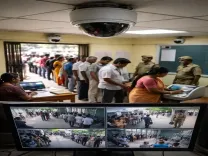Why are Five Major Naga Tribes Protesting in Kohima?

Synopsis
Key Takeaways
- Thousands of tribal individuals protested in Kohima against the outdated job reservation policy.
- The 5-Tribes Committee on Review of Reservation Policy is advocating for change.
- Demonstrators call for either the repeal of the policy or redistribution of unfilled reserved positions.
- The Nagaland government acknowledges ongoing discussions regarding the policy.
- The issue highlights the need for equity and better representation in job allocations.
Kohima, July 9 (NationPress) Ignoring governmental requests, thousands of tribal individuals from five Naga organizations gathered on Wednesday outside the Nagaland Civil Secretariat, demanding a reassessment of the state's job reservation policy.
Under the banner of the 5-Tribes Committee on Review of Reservation Policy (CoRRP), the protestors called for either the abolition of the current job reservation policy, in place since 1977, or the reallocation of unfilled reserved positions exclusively to these five principal tribes.
The CoRRP is composed of five Naga tribal organizations: the Angami Public Organization, the Ao Senden, the Lotha Hoha, the Rengma Hoho, and the Sumi Hoho, representing the major tribal communities of Ao, Angami, Lotha, Rengma, and Sumi.
The demonstrators, dressed in traditional attire, showcased banners and placards stating, "We protest against 48 years of indefinite reservation policy," "Backward Tribe (BT) reservation without minimum cut-off marks is a mockery of the system," "BT reservation in 48 years has outlived its intended purpose," and "48 years of patience on BT reservation has become unbearable."
Labeling the 1977 reservation policy as 'outdated and oppressive,' the CoRRP insisted on its repeal or the redistribution of unutilized quotas to the five tribes.
The Nagaland government had urged the 5-Tribes CoRRP on Tuesday to halt the strike, asserting that the issue was already under review.
A senior official from the Nagaland government indicated that attention had been drawn to the proposed sit-in protest by the Five-Tribes Committee on Review of Reservation Policy at the Nagaland Civil Secretariat.
In an official statement from the Chief Secretary's office, the government emphasized that the matter had been discussed during a meeting on June 3.
This meeting, chaired by Deputy Chief Minister (Home) Yanthungo Patton, included representatives from the Five-Tribes CoRRP and the apex bodies of the five involved tribes.
During this discussion, it was communicated that their demands would be forwarded to the state Cabinet for consideration. Subsequently, on June 12, the state Cabinet agreed in principle to form a Commission to examine all facets of the reservation policy in government employment.
The Personnel and Administrative Reforms Department has since been actively implementing the necessary follow-up actions as directed by the Cabinet.
In light of this ongoing process, the state government has appealed to the Five-Tribes CoRRP to desist from proceeding with the planned agitation. The government reiterated its commitment to resolving the issue through proper institutional mechanisms, according to an official statement.
On May 29, the Five-Tribes CoRRP conducted protest rallies across various districts of Nagaland in support of their demands. The Nagaland government initially implemented the 1977 reservation policy for Backward Tribes (BT), reserving 25 percent of jobs for seven tribes in non-technical and non-gazetted posts for a decade.
These tribes were classified as backward due to their educational and economic disadvantages and limited representation in state services. Over the years, the reservation has increased to 37 percent, with 25 percent for seven eastern Nagaland tribes and 12 percent for four other BT tribes.
The government has also indicated that the state Cabinet will convene and make a decision on the matter once the Chief Minister, currently out of the state, returns.
On July 2, Chief Minister Neiphiu Rio appealed for public patience, stating that the Commission's work is "very detailed" and cannot yield immediate results. He further clarified that any changes—whether in administration, reservations, or delimitations—should occur only after the census, expected to take place in 2027.










